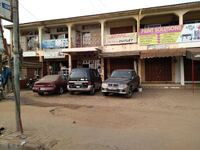Africa Info
Der jetzige Name Africa stammt aus der griechischen und römischen Kolonisation Nordafrikas und wurde erstmalig vom römischen Senator und Feldherrn Scipio Africanus (der Eroberer Karthagos) verwendet. Der Begriff stammt vom Namen eines lybischen Volkes, den Afri, die in der Region der Hafenstädte Karthago und Utica lebten.
Nachdem im Jahr 146 v. Chr. Karthago durch die Römer besiegt wurde, benutzten die Besatzer für ganz Nordafrika bis zur Grenze nach Ägypten den Namen Africa procunsularis, während der Begriff libýe für den gesamten Kontinent stand. Erst im späten 3. Jahrhundert erlangte der Begriff Africa die Bedeutung als Name für den gesamten Kontinent.
Ägypten, Algerien, Angola, Äquatorialguinea, Äthiopien, Benin, Botswana, Burkina Faso, Burundi, Dschibuti, Elfenbeinküste, Eritrea, Gabun, Gambia, Ghana, Guinea, Guinea-Bissau, Kamerun, Kap Verde, Kenia, Komoren, Kongo (Demokratische Republik), Kongo (Republik), Lesotho, Liberia, Libyen, Madagaskar, Malawi, Mali, Marokko, Mauretanien, Mauritius, Mosambik, Namibia, Niger, Nigeria, Ruanda, Sambia, São Tomé und Príncipe, Senegal, Seychellen, Sierra Leone, Simbabwe, Somalia, Südafrika, Sudan, Südsudan, Swasiland, Tansania, Togo, Tschad, Tunesien, Uganda und Zentralafrikanische Republik.
In Afrika leben 1,256 Milliarden Menschen. Das entspricht etwa einem Sechstel der Weltbevölkerung. Prognosen zufolge könnte sich die Bevölkerungszahl bis zum Ende des 21. Jahrhunderts vervierfachen.
The current name "Africa" originates from the Greek and Roman colonization of North Africa and was first used by the Roman senator and general Scipio Africanus (the conqueror of Carthage).
The term comes from the name of a Libyan people, the Afri, who lived in the region of the port cities of Carthage and Utica.
After Carthage was defeated by the Romans in 146 BC, the occupiers referred to all of North Africa up to the border with Egypt as "Africa proconsularis," while the term "Libya" referred to the entire continent. It was not until the late 3rd century that the term "Africa" gained significance as the name for the entire continent.
Currently, Africa consists of 54 recognized states:
Egypt, Algeria, Angola, Equatorial Guinea, Ethiopia, Benin, Botswana, Burkina Faso, Burundi, Djibouti, Ivory Coast, Eritrea, Gabon, Gambia, Ghana, Guinea, Guinea-Bissau, Cameroon, Cape Verde, Kenya, Comoros, Congo (Democratic Republic), Congo (Republic), Lesotho, Liberia, Libya, Madagascar, Malawi, Mali, Morocco, Mauritania, Mauritius, Mozambique, Namibia, Niger, Nigeria, Rwanda, Zambia, São Tomé and Príncipe, Senegal, Seychelles, Sierra Leone, Zimbabwe, Somalia, South Africa, Sudan, South Sudan, Eswatini, Tanzania, Togo, Chad, Tunisia, Uganda, and the Central African Republic.
Africa is home to 1.256 billion people, which is about one-sixth of the world’s population. Projections suggest that the population could quadruple by the end of the 21st century.
You loved me… You chose me… Among the rest...
Allgemeine Informationen über Afrika
Geografie
- Lage: Kontinent im Süden der Erdhalbkugel
- Fläche: Ca. 30,37 Millionen km² (einschließlich Inseln)
- Nachbarländer: Umgeben von Mittelmeer, Atlantischem Ozean, Indischem Ozean und Rotem Meer
Bevölkerung
- Einwohnerzahl: Ca. 1,4 Milliarden (Stand 2023)
- Ethnische Gruppen: Über 3.000 ethnische Gruppen, darunter Araber, Berber, Bantu, Niloten und viele mehr
- Amtssprachen: Über 2.000 Sprachen, darunter Arabisch, Englisch, Französisch, Swahili und Portugiesisch
Wirtschaft
- Wirtschaftssektoren: Landwirtschaft, Bergbau, Dienstleistungen, Tourismus
- Wichtige Rohstoffe: Öl, Gold, Diamanten, Kobalt, Kaffee, Kakao
- Wachstum: Afrikas Wirtschaft wächst schnell, mit einer zunehmenden Diversifizierung
Kultur
- Küche: Vielfältige Gerichte, die von Region zu Region variieren (z.B. Couscous, Jollof-Reis, Injera)
- Feste: Feste wie das Eid al-Fitr, das Erntedankfest und zahlreiche traditionelle Feste
- Musik: Reiche musikalische Traditionen, einschließlich Afrobeat, Reggae, Hip-Hop und traditionelle Musik
Politisches System
- Regierungsformen: Vielfältige Systeme, darunter Demokratien, Monarchien und autoritäre Regime
- Organisationen: Afrikanische Union (AU), ECOWAS, SADC und andere regionale Organisationen
Sehenswürdigkeiten
- Pyramiden von Gizeh: Eines der sieben Weltwunder der Antike in Ägypten.
- Victoriafälle: Eine der größten Wasserfälle der Welt, gelegen an der Grenze zwischen Sambia und Simbabwe.
- Serengeti-Nationalpark: Berühmt für die Tierwanderungen und die vielfältige Tierwelt.
Afrika ist ein Kontinent mit reicher Geschichte, kultureller Vielfalt und enormen natürlichen Ressourcen.
General Information about Africa
Geography
- Location: Continent in the Southern Hemisphere
- Area: Approximately 30.37 million km² (including islands)
- Surrounding Bodies of Water: Mediterranean Sea, Atlantic Ocean, Indian Ocean, and Red Sea
Population
- Population Size: Approximately 1.4 billion (as of 2023)
- Ethnic Groups: Over 3,000 ethnic groups, including Arabs, Berbers, Bantu, Nilotes, and many more
- Official Languages: Over 2,000 languages, including Arabic, English, French, Swahili, and Portuguese
Economy
- Economic Sectors: Agriculture, mining, services, tourism
- Key Resources: Oil, gold, diamonds, cobalt, coffee, cocoa
- Growth: Africa's economy is growing rapidly, with increasing diversification
Culture
- Cuisine: Diverse dishes that vary from region to region (e.g., couscous, jollof rice, injera)
- Festivals: Celebrations such as Eid al-Fitr, harvest festivals, and numerous traditional festivities
- Music: Rich musical traditions, including Afrobeat, reggae, hip-hop, and traditional music
Political System
- Forms of Government: Diverse systems, including democracies, monarchies, and authoritarian regimes
- Organizations: African Union (AU), ECOWAS, SADC, and other regional organizations
Attractions
- Pyramids of Giza: One of the Seven Wonders of the Ancient World located in Egypt.
- Victoria Falls: One of the largest waterfalls in the world, located on the border between Zambia and Zimbabwe.
- Serengeti National Park: Famous for its wildlife migrations and diverse animal life.
Africa is a continent with a rich history, cultural diversity, and immense natural resources.
